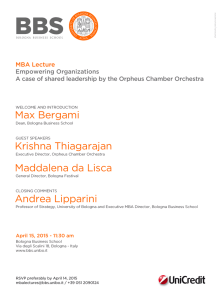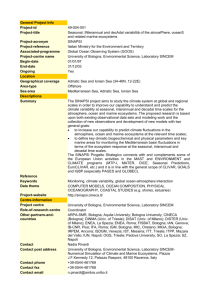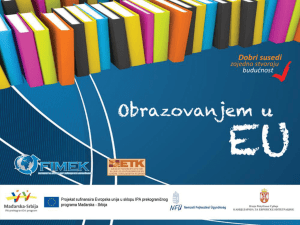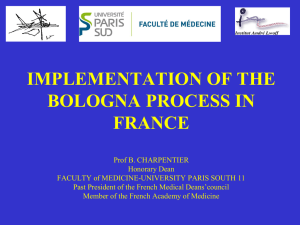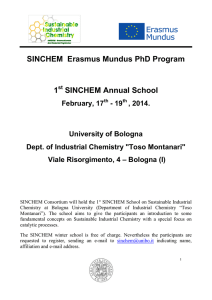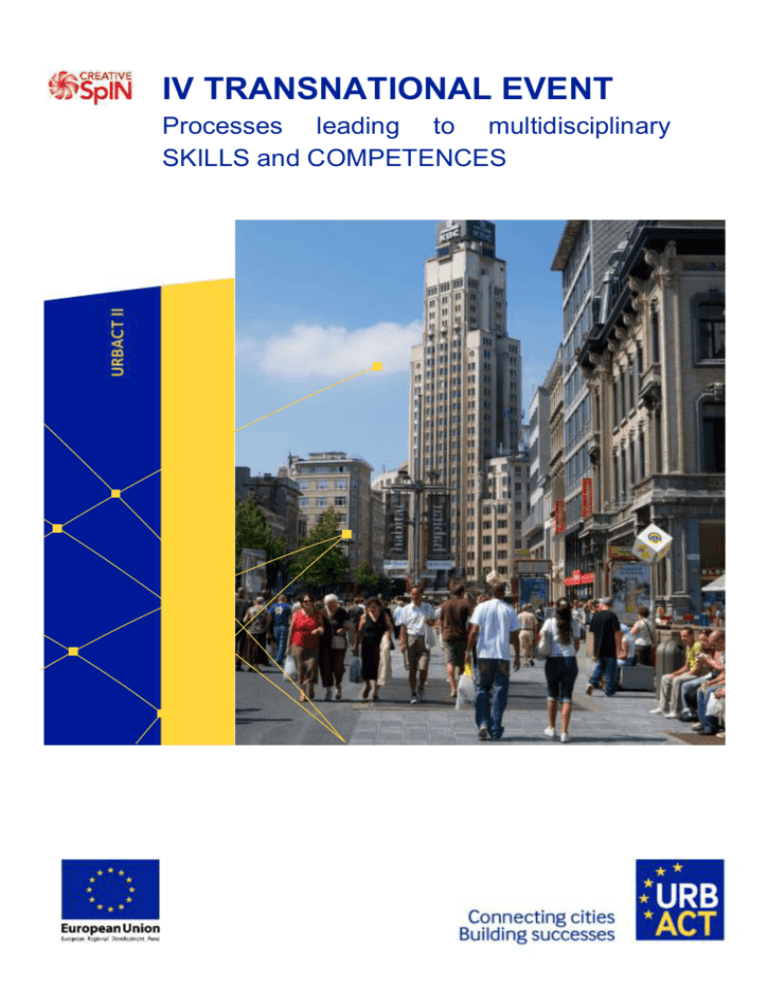
IV TRANSNATIONAL EVENT
Processes leading to multidisciplinary
SKILLS and COMPETENCES
2
THE CREATIVE SpIN’s IV TRANSNATIONAL EVENT TOOK PLACE IN BOLOGNA ON 26-28 MARCH
2014. IT FOCUSED ON INNOVATIVE PROCESSES LEADING TO MULTIDISCIPLINARY
COMPETENCES AND SKILLS. IN BOLOGNA, DRAFT LOCAL ACTION PLANS WERE ALSO
PRESENTED AND DISCUSSED USING THE DE BONO SIX THINKING HATS METHODS.
The Creative SpIN project
IVth Transnational Event
Creative SpIN aims at identifying the best tools and
methods to stimulate creative spillovers. It will do
that led by the so called “3 Ps”: Partners will test
new PROCESSES, experiment new learning
methods to grow creative PEOPLE, as well as by
identifying a number of key PROJECTS, which will
act as “demonstrators” of creative spillovers.
The fourth Transnational Event (TE) focused on
multidisciplinary competences and skills (PEOPLE).
Creative spillovers
The 3Ps will be “explored” through activities to be
carried out both at the local and transnational level,
with focus on a number of sectors of common
interest for partners, namely:
-
Urban Development/Energy
Manufacturing
ICT/R&D
Tourism
Health
Education
The City of Bologna proposed a full programme of
events over 3 days comprising visits of known
companies (e.g. Ducati and Lamborghini), initiatives
to preserve heritage in a creative way (Vecchia
Scuola Bolognese on tortellini), activities with elite
educational
establishments
practicing
multidisciplinarity (Collegio Superiore), a visit to a large
culture industry fair (the Children’s Book Fair) and
interventions at political, business, academic and
administrative levels (Bologna City Council, Emilia
Romagna Region and University of Bologna). The
city also shared with participants the culture and
lifestyle of the place in cooking, aesthetics and
architecture (the fabulous Palazzo d’Accursio). The
programme was set up by the Economic and City
Promotion Department of Bologna under the
leadership of the Head Mauro Felicori.
Agenda of the IVth Transnational Event on ‘SPILLOVER’ &
PEOPLE, Bologna, Italy
3
Wednesday 26th March
VENUE: Fabbrica e Museo Ducati - via Antonio Cavalieri Ducati 3
11.00 am – 13.30 pm Study Visit: Ducati museum, factory and laboratory Fisica in Moto
VENUE: Bologna Fiere (Entrance - Viale Aldo Moro or Piazza Costituzione)
VENUE: Children's Book Fair, Sala Melodia, Centro Servizi, Blocco B - Piazza della Costituzione 6
2.00 pm - 2.30 pm
LUNCH BREAK
2.30 am – 4.00 pm
Special Event: The publishing sector and the creative spillover effect
A discussion with Philippe Kern
4.00 pm – 6.30 pm
Study Visit: Children's Book Fair and Expopixel
7.30 pm – 9.30 pm
WELCOME DINNER
VENUE: Cappella Tremlett, Palazzo Re Enzo - Piazza Nettuno 1
9.30 pm - 10.00 pm
Special Event: Inaugurazione 'Clorofilla' interactive installation of Wonderactive
Thursday 27th March
VENUE: Cappella Farnese, Palazzo d'Accursio – Piazza Maggiore, 6
9.30 am – 10.30 am
Welcome in Bologna
9.30 am – 9.45 am
Welcome Speech
Virginio Merola (Mayor of Bologna)
9.45 am – 10.10 am
Knowledge transfer as a tool for development
Patrizio Bianchi (Deputy Mayor to Education, Training, University, Reserch and
Labour, Region Emilia-Romagna)
10.10 am – 10.30 am
Industrial development in the capital of culture
Ivano Dionigi (Dean of University of Bologna)
10.30 am – 10.55 am COFFEE BREAK
VENUE: Lapidario del Museo Civico Medievale – Via Manzoni 4
11.00 am - 12.20 am "Breaking the silos" Collegio Superiore Model
Chair: Mauro Felicori (Head of the Economic Development and City Promotion
Department – Municipality of Bologna)
11.00 am - 11.10 am
The interdisciplinary course to break down silos of knowledge
Luca Ciotti (Dean of the Collegio Superiore)
11.10 am - 11.20 am
Program and life at Collegio Superiore
Angela Velkova (Student of the Collegio Superiore)
11.20 am – 11.30 am
My life after the Collegio Superiore
Paolo Bailo (President of the Alumni Association of the Collegio Superiore)
11.30 am - 12.20 pm
Informal network meeting with the students – speed dating
4
VENUE: Vecchia Scuola Bolognese, Via Galliera 11
12.30 pm - 1.00 pm Study Visit: Vecchia Scuola Bolognese
1.00pm - 2.00 pm
LUNCH
VENUE: Atelier, Urban Center - Piazza Nettuno 3
2.00 pm - 4.15 pm
Creative SpIN Project LAPs - For Partner City Coordinators and LSGs members
2.00 pm - 2.20 pm
WP 3: IMPACT ON LOCAL POLICIES AND PRACTICES
Philippe Kern and Denise Barrett
Presentation about Local Action Plan
Philippe Kern
4.45 pm - 6.45 pm
2.20 pm - 4.15 pm
Comparison of LAPs and discussion
10’ per City LAP using “De Bono hats”
4.15 pm – 4.45 pm
COFFEE BREAK
Creative SpIN Project Management and Administration Session
For Partner City Coordinators (LSGs members attendance is optional)
4.45 pm – 5.30 pm
WP 1: Project Coordination- Philippe Kern and Denise Barrett
The URBACT Mid Term Review Exercise:
● Self Assessment Analysis: Presentation of Key Issues - Philippe
● Group discussion and actions for the final submission to URBACT (24 4 2014)
External Expertise Budget:
● Work Package 4 Dissemination Plan - Options
● Work Package 1 Mid Term Review - Options
● Work Package 1 Lead Partner Thematic Expert - Options
5.30 pm – 6.00 pm
WP 2: Transnational Exchange and Learning - Denise Barrett
Future Transnational Seminars:
● Rotterdam Outline - Chantal
● Kortrijk Outline - Frans
● Site Visit Options - Philippe/Denise.
6.00 pm – 6.15 pm
WP 4: Communication and Dissemination - Denise Barrett
● Update - Communications Budget Commission
● Discussion (drawn from key issues identified in the Semester 1&2 Progress Reports
and Mid Term Review Self Assessments)
6.15pm - 6.30pm
Questions & Answers - moderated by Philippe Kern
6.30pm - 6.40pm
Concluding Remarks - Denise Barrett
6.40pm - 6.45pm
Arrangements for the evening - Silvia Porretta
VENUE: Urban Center – Piazza Nettuno 3
6.45pm – 7.00pm
Special Event: Ri///flux - Preview
VENUE: Hotel I Portici, Via dell'Indipendenza 69
9.00 pm – 11.30 pm
LUNAR DINNER
Friday 28th March
5
VENUE: Aula Magna, Regione Emilia-Romagna - Viale Aldo Moro 30
9.00 am - 10.45 pm
Creative spillover for a local development
A survey on the influence of arts on the economic and industrial development
Open workshop on manufacturing, arts and creative spillover
9.00 am – 09.15 am
Smart specialization strategy and creative industries
Silvano Bertini (Economic Development, Industrial Research and Technology Innovation
Department - Emilia Romagna Region)
9.15 am – 9.30 am
From the creator to the creative: building new identities in the CCIs era
Giorgia Boldrini (Economic Developement and City Promotion Department Municipality of Bologna)
9.30 am – 9.45 am
Design and self-production: the paradigm of the maker
Elena Formia (Industrial Product Design, Architecture Department University of Bologna)
9.45 am – 10.00 am
Visible and invisible links between art and everyday life
Walter Guadagnini (Department of Photography - Accademy of Fine Arts of Bologna)
10.00 am – 10.15 am
Artworks, cultural value, material culture
Giacomo Manzoli (Department of The Arts - University of Bologna)
10.15 am – 10.30 am
Fashion: material culture for creativity and economic development
Nicoletta Giusti (Management Department - University of Bologna)
10.45 am – 11.30 am COFFEE BREAK
VENUE: M.A.S.T - Via della Speranza 42
12.00 pm - 1.00 pm Study Visit: M.A.S.T Foundation
(Manufacturing, Arts, Experimentations and Technology)
1.30pm - 2.30 pm
LUNCH
VENUE: Lamborghini – via Modena 10, Sant'Agata Bolognese
2.30 pm - 5.00 pm - Study Visit: Lamborghini
VENUE: Cantina Bentivoglio – via Mascarella 4/B
8.00pm – 10.00pm – Dinner and Regional wine tasting
Saturday 29th March
VENUE: Certosa di Bologna, via della Certosa 18
9.30 am – 11.30 am
Study Visit: Certosa Cemetery
VENUE: Meloncello – Via Porrettana 1
11.45 am – 1.30 pm
Study Visit: San Luca Porticoes and #unpassopersanluca - Porticoes
1.30 pm – 2.30 pm
LUNCH
2.30 pm – 3.30 pm
Study Visit: San Luca Porticoes and #unpassopersanluca – Sanctuary
WORKING SESSIONS
6
First day – 26th March
The activities were kicked-off by the visit to the
Ducati museum and factory. The visit included the
presentation of “Fisica in Moto”, an interactive
physic laboratory aimed at high school children.
The idea is to present science and technology from
a more attractive angle to young people and apply
physics learning in relation to manufacturing.
The physic lab coordinator was employed by Ducati,
working with 25 schools across Bologna. The
coordinator used technology to engender elements
of competition in learning.
-
Creative spillover projects are difficult to
progress
because
of
bureaucratic
complexities, which results in a sense of
‘running in mud’.
-
Cultural industries are not necessarily more
innovative, but cultural industries are more
used to manage talents, whilst industry is
more
comfortable
with
standardised
process;
-
Writers and publishers can help develop
narratives on brands;
-
In Rotterdam, there is an example of art
production where a urban planner and a
real estate work together to make a building
site
more
attractive
for
renting
(www.enterthemothership.com)
-
Spillovers have been experimented with
doctors and publishers, to offer to one year
old children their first book.
-
A bank has been working with a publisher to
award a prize for storytelling to immigrants’
children.
-
Writers can also collaborate with publishers
to generate more attractive household
appliance guides.
Ducati believe that helping the students enjoy their
experience, helped create connections between
school and the wider economy.
In the afternoon, participants attended the Bologna
Children’s Book Fair, the largest book fair for
children in the world. A debate took place on “The
Publishing Sector and the Creative Spillover Effect”.
The format was an interactive panel discussion with
representatives of the publishing sectors (Carlo
Galluci, Emilio Varra and Piero di Domenico) and
Creative SpIN partners introduced by Mauro Felicori
and moderated by Philippe Kern who first presented
the concept to publishers.
Learning points
Whilst the debate started with puzzlement and
skepticism over the question of creative spillovers,
publishers were rapidly able to give examples of
spillovers in their activities.
All rights reserved by Incredibol! - l'Innovazione
Creativa di Bologna
The outcome of the debate can be summarised as
follows:
-
There is wealth of culture and creativity in
Italy, but this isn’t sufficiently mobilised to
create economic prosperity.
It was felt that publishers should work on opening
new avenues, as traditional retail approaches would
not necessarily make the business easier, especially
for local language books and publishers with limited
promotional budgets. It is also important that
independents act more collectively, to create scales
that will help mitigate the market constraints above.
To help spillovers it was also suggested to support
projects to develop “in” businesses (although the
problem is that business is complex because of
regulations, traditions, funding, bureaucracy...).
Technology represents an opportunity to reach out
in a different way, provided licensing issues are
addressed and smaller publishers are not excluded
from the digital market.
7
At the end of this debate, participants were taken to
visit the Bologna Children’s Book Fair and met the
award winners of the Incredibol project. This is
funded by the city of Bologna to help young creative
startups.
Second day – 27 March
th
1.
Welcoming
d’Accursio
addresses
at
Palazzo
Virginio Merola - Mayor of Bologna
Mr. Merola welcomed the participants and
highlighted the initiatives of the city in the spirit of
Creative SpIN such as the Incredibol projects but
also other initiatives to foster entrepreneurship and
innovation. The city is the place of the oldest
university in Europe (founded in 1088) with 87,000
students. He insisted on the need to develop
interactions between manufacturing industries and
the creative sector to support innovation.
Patrizio Bianchi - Deputy Mayor of Education,
training, university, research and labour of the
Region Emilia Romagna
The Deputy Mayor Bianchi presented the concept of
innovation as the result of group efforts. Culture is
the expression of the collective and therefore it
plays a significant role in innovation. “We have to
review structures and establish transnational
relations between different countries and different
realities or competences”, he said.
New technology is an accelerator but represents
also a danger. The expression “surfing” the web
highlights the fact that surfing leads to sinking.
Surfing is not creating. Therefore, personal
relationship cannot be eliminated and the city is a
central place to foster international relationships. Mr.
Bianchi took the example of the music industry: with
the digital revolution and the end of CD sales, the
industry had to reestablish the personal relationship
through life performances. In the personal
relationship, cities play an essential role.
There are two meaning for the word “city”:
1. Urbs (Latin) – buildings and streets
2. Polis (Greek) – citizens’ participation to take
part to political life
Today cities host exchange and transfer knowledge
tools much more than industries. Urbs need to turn
into polis by developing citizens’ trust and
confidence. Only cities that turn into polis will be
successful in the future.
Ivano Dionigi - Dean of University of Bologna
University is the place where new knowledge is
established. Scientists can no longer ignore history,
culture and needs to anticipate social needs. It is
about overcoming boundaries between places and
knowledge.
The Dean referred to Steve Job, who illustrates the
“Renaissance engineer” concept. The University is
about fostering the alliance of different knowledge to
develop new profiles that are aware of the past, to
confront the challenges of the future. The University
has to overcome boundaries of specialisation and
invent new professional profiles. Humanists have to
help scientists to better pose questions. This is the
reason why the University has launched a new MSc
in Innovation and Arts and Culture (GIOCA) already
more than ten years ago.
The word “economy” needs to be rediscovered and
given its true full dimension. However, the dialogue
between art and industry is challenging. The Dean
called for “craftsmanship knowledge” and the
implementation of new strategy for economic growth
through creativity.
2.
Collegio Superiore – University of Bologna
The Collegio Superiore is part of the Institute of
Advanced Studies - devoted to research - and
welcomes master students selected on merit-based
criteria. These are required to maintain a high level
of performance to remain at the Collegio.
The Director Luca Ciotti, (Professor of Astro
Physics), explained that the Collegio is a laboratory
of excellence, introducing new kinds of didactic at
university. The best students - around 87 (out of
87.000 students in total at the University of Bologna)
- are at the Collegio. They are offered
interdisciplinary courses from the best professors.
For instance, academic hours are mixed with
seminars on differential geometry, philosophy, and
history or particles physics. Interdisciplinarity is
fostered through lectures on different subjects.
However, no specific courses on creativity and
interdisplinarity are offered. The idea is to reflect on
different themes through different specialties to
open the minds of students.
Speed dating exercise with Collegio Superiore’s
students on ‘breaking silos’.
8
Creative SpIN members were invited to rapid
meetings (5 minutes each) with 6 students of the
Collegio from different disciplines (law, business,
mathematics, sociology, linguistic) to address
innovation stimulation in relation to various thematic:
education, tourism, healthcare, manufacturing,
urban development and R&D. How to innovate
through the breaking of silos?
Process: 2 Creative SpIN members questioned
students in turn in relation to their own assigned
economic sector topic.
developing general culture in the first years of
university to develop polyvalence and open the
minds.
-
Learning through games and apps should be a
priority in the young age to develop curiosity to
learn and concentration. The most important is
to raise curiosity as curiosity will lead to
intelligence.
Healthcare:
Get students to do social works in the hospital;
-
Use apps to measure patients’ health
-
Develop digital medical records.
Tourism:
Use capital city sites to signpost/redirect tourists
to second cities (e.g. Birmingham in the UK,
Rotterdam in the NL) to discover the authentic
(as opposed to the global).
Position second cities more actively in terms of
cost/benefits, e.g. accommodation, fee’s,
general cost of living.
Use Urban Games to collect data as part of fun,
social activity.
The following ideas emerged from the speed dating
process:
Education:
Valorise craftsmanship: in the Renaissance,
artists became intellectuals. Manual skills
should go hand in hand with intellectual abilities.
-
-
Skope (Macedonia) has set up a factory of
knowledge - the basis is for private companies
to work with students on real life projects
through open innovation processes. The idea is
to get interdisciplinary responses on given
challenges involving graphic designers, fashion
designers, economist, linguists and lawyers
from the “factory”.
Provide compulsory interdisciplinary course –
example: learn about “forgery” from the point of
view of philology, medicine or law.
-
Education should not be too specialised –
provide everybody scientific skills for instance to
students in humanities.
-
We should reduce the amount of learning – why
studying criminal law if you are not going to be a
penalist? More time should rather be spent on
Manufacturing:
the added value of creativity is more evident in
marketing and promotion processes than in
manufacturing processes.
There should be QR codes on packaging to identify
manufacturers.
Urban Development:
at the creative incubator of Ljubljana, citizens are
invited to community and free dinners.
Public space can be used in a similar way to
promote social cohesion through cultural activities.
R&D:
-
-
9
Make visual artists and scientists work
together so that scientists can better
communicate the results of their research;
Set up competition for artists within R&D
departments to select the best artist to help
visualise the results of research.
Outcome: very good ideas very often generated by
obviously very bright students. However, time was
lacking to make the most of the interaction. There
was little time to discuss the outcome and take stock
of the experience.
3.
-
Insufficient definition of the LAPs’ goal and
objectives;
-
Policy recommendations putting emphasis on
CCIs (to build capacities) rather than on creative
spillovers;
-
Insufficient identification of bottlenecks that
require to be addressed through policy action in
order to enable spillovers;
-
Need to identify a political champion to carry the
LAP in the future;
-
Sometimes, the lack of description of the local
creative assets capable of being mobilised to
enable creative spillovers and fulfill objectives.
LAP Session
In the afternoon, there was a long session on Local
Action Plan. Philippe Kern made a presentation on
the LAP and proposed elements of drafting and
structuring to help members of Creative SpIN. 3
LAPs (Bologna, Rotterdam and Birmingham) were
subject to peer review that was done in two different
ways:
1. Peer review amongst members and with the
Lead Expert to provide constructive comments
following the presentation;
2. Peer review by using the De Bono Six Thinking
Hats Method: six hats were distributed to the
participants. Each one represented a different
way of thinking (based on facts, creativity,
benefits, cautions, feelings and process). The
Bologna’s LAP was subject to this exercise.
Interestingly, Rotterdam has commissioned a
researcher to highlight 3 cases of creative spillovers,
which will include and analyse of key the processes
used.
Dinner took place at the Eden Theater in the Hotel “I
Portici”. The Lunar dinner was inspired by The
Lunar Society of Birmingham which was a dinner
club of prominent intellectuals and industrialists,
including: Erasmus Darwin, James Watt and
Matthew Boulton, who met regularly between 1750
and 1830.
All rights reserved by Incredibol! - l'Innovazione
Creativa di Bologna
Learning: 30 minutes were not enough to give
depth to the De Bono exercise, but it was useful in
term of introducing the concept to partners and
generate interactions.
The peer review showed the following:
This was the opportunity of the members of the
Creative SpIN to mingle with more than 60 guests
from the Bologna business and artistic community to
discuss informally about relationship between art
and industry. The event was moderated by Mauro
Felicori – Head of the Economic and City Promotion
Department of the City of Bologna.
Delegates considered the following questions:
-
Does Art Love Industry? Are futurists a footnote
of history or are they forward looking?
10
-
Are past and tradition an obstacle to the
development of new ideas?
-
Does Industry love art?
-
Is there more creativity in Science, technology
or the Arts?
Third day – 28 March
th
Series of intervention at the headquarters of the
Region Emilia-Romagna
Silvano Bertini – Responsible Creative Economy
Regione Emilia Romagna, Presentation on Smart
Specialisation Strategy
The regional authority believes that art and creativity
provide jobs and support innovation. “We want to
take initiatives to promote CCIs”, Silvano Bertini
said. He then continued “We are focusing on
creative resources and foster enterprises. This is
now part of the region’s smart specialization
strategy (2014-2020)”. The region’s economy relies
on manufacturing. The regional authority now wants
new businesses with high content of skills and
knowledge to emerge such as CCIs.
The role of CCIs is to diversify the regional
economy, involve new players, link to urban
dimension (a priority of Structural Funds), create a
new urban economy and contribute to social
changes (inspired by northern Europe). CCIs and
cultural institutions are important as they carry out
innovative activities. Bertini suggested that
management of these institutions should be
reviewed so as to make them contribute more to the
economic and social life of the city.
There are other challenges to be faced: passing
from preservation to innovation, make people aware
of the economic potential of this sector and
matching humanistic and expressive competencies
with technology and ICT as well as management
skills.
In the 2014-2020 phase, Emilia-Romagna Region
will use the ERDF and ESF to further develop new
business networks and support learning and
training. A new programme will be rolled out aiming
at encouraging transversality. The focus will be
organic growth of CCIs. Cooperate more at
international level is also an objective.
Giorgia Boldrini – Administrator Economic
Development Department of City of Bologna, “From
the Creator to the Creative”
There are new behaviours – collaboration, cocreation, open innovation, cross sectoral innovation,
social innovation, etc. - rooted in old structures.
Universities, art academies, public administration
and training institutions have problems at adapting
to new ways of acting and working. CCIs can help.
However, new challenges also exist for CCIs:
preservation of diversity, balancing economic and
social value or making ICT a means to an end (tool
rather than a goal – it should be content based).
New instruments should be used to face such
challenges, from public-private alliances, to
intersectoral approaches, adaptation of support
schemes, flexibility and development of horizontal
partnerships. Otherwise, the risk is to treat creativity
only as a buzzword. Heterogeneity and “over
simplification” of the sector (circus vs. ICT) is
another threat.
Elena Formia – Industrial Product Design, Architecture
Department, University of Bologna
New forms of craftsmanship and solitary production
concepts are rising: how to design training pathways
for these new professionals? Elena Formia insisted
on the need to create new paths based on
openness, creativity and flexibility.
There were then further interventions from Walter
Guadagnini from the Academy of Fine Arts,
Giacomo Manzoli and Nicoletta Giusti from the
University of Bologna on art, creative industries and
economic development1.
Site visit at M.A.S.T. Foundation
Participants where then invited to visit the M.A.S.T.
(Manufacturing,
Arts,
Experimentations
and
2
Technology) , a foundation focusing on art,
technology and innovation to support creativity and
entrepreneurship. The Foundation was founded by
the businesswoman Isabella Seragnoli, unique
shareholder of COESIA, a global group of
companies of industrial solutions based on
innovation, with headquarters in Bologna.
Inaugurated in October 2013, the M.A.S.T. has just
started its activities developed in five main spaces:
1
Exhibition gallery
Cafeteria
Creative nursery (for employees’ children)
Video streaming of the conference :
http://videocenter.lepida.it/videos/video/891/
2 http://mast.org/en
-
11
Technology academy
Wellness centre
Creative SpIN members visited an art exhibition
looking into manufacturing mechanics and
processes. The group was also introduced to the
creative nursery, a colorful space featuring a very
beautiful design. Teaching methods are inspired by
the Reggio Emilia Approach, an innovative
educational philosophy focused on creativity and
freedom of expression.
After lunch we were taken to visit the Lamborghini
factory, to understand the research undertaken by
the company to reduce CO2 emission, the
importance of design and its inextricable relationship
to science and technology. One of the 17 designers
working at Lamborghini is in charge of the colour
strategy of the company.
Conclusions and outcome of the IVth Creative
SpIN Transnational Event
The scale and scope of the Bologna programme
was enormous and varied. The effort made in the
detail was incredible, from the hand printed delegate
badges and brochures, to the range of bespoke site
visits offered.
This resulted in many interesting events and
experiences. There was sense that there had been
too many events and presentations, which affected
the length of time for more detailed interactions. The
Creative SpIN Team had drawn together many
senior representatives from industry, academia and
the Local Authority politicians and administrators.
The De Bono peer review and the Speed dating
exercise with students from the Collegio Superiore
were probably the most pertinent experiences, in so
far as we tested new processes of interaction.
Naturally Bologna took the opportunity to show how
creative the city is as well as its authentic and
international dimension. In relation to Creative SpIN,
the event showed that it was difficult to engage with
the local manufacturing industries on creative
spillovers. We missed an event where those
manufacturers would explain their skepticism in the
processes managed by the city of Bologna to
encourage such spillover. The city should have
shared its problems in its intermediation between
manufacturing and the CCIs and break silos. We
met the different stakeholders but we did not
experience the meeting of the different set of minds.
This was maybe a lost of opportunity to engage with
a reluctant sector. We however felt a great political
ambition to support creative spillovers and important
awareness at the highest political level (which was
perfectly well mobilised for the event). This should
boost the prospect of the future Local Action Plan.
For more information, please contact Denise
Barrett @ Birmingham City Council:
denise.barrett@birmingham.gov.uk
APPENDIX – List of participants
Creative SpIN Partners
12
Birmingham
Denise Barrett – Birmingham City Council, Lead
Partner
Essen
Bologna
Ekaterina Baskakova – City of Bologna
Silvia Porretta – City of Bologna
Matteo Turricchia – Progetto Incredibol!, City of
Bologna
Luigi Virgolin
Municipality of Bologna
Peddis
Anika Ellwart – City of Essen, ℅ Atelierhaus
Mons
Stéphane Maucci – Head of the Mayor’s Cabinet,
City of Mons
Nicola de Palma – City of Mons
Košice
Michal Hladký – Košice 2013 and Institute for
Creative Economy
Kortrijk
Frans Van Den Bossche – City of Kortrijk
Óbidos
Miguel Silvestre, Coordenador - Economia da
Criatividade e Inovação, Óbidos Criativa EEM
Ricardo Cardoso ULSG
Children's Lisa
Book Fair Pellegrino
Daniele
Campagnoli
Nino
Giordano
Marco
Tavarnesi
Alessandro
Palmaccio
Marco Nardini
Ines Ivkovic
Philippe Kern - Managing Director at KEA, Creative
SpIN’s Lead Expert
Valentina Montalto – Lead Expert’s assistant
Livio Talozzi
Michele Pio di
Pasquale
Federico La
Piccirella
Alessandro
Fabbri
All the fruit
All the fruit
publishing services
INUIT
INUIT
OTAGO
MINIMESS
WONDERACTIVE
WONDERACTIVE
WONDERACTIVE
WONDERACTIVE
Welcome in Bologna,
March 27
Speakers
Children's Book Fair,
March 26
Company
Gallucci editore
Hamelin
Bottega Finzioni
RENBOOKS
Special event in Cappella Santa Maria dei
carcerati, March 26
Speakers and other participants
Workshop Name
Speakers Carlo Gallucci
Emilia Varrà
Piero Di
Domenico
Audience Jessica Pinotti
Stephen
Cheetham
Emanuela
Vita
Cristiano
FRUIT
ExpoPixel Diletta
MUSEUM RELOADED
Pignedoli
Alice Giorgetti G-COM
Rotterdam
Chantal Olffers, Senior Policy Advisor - Creative
Industries at City of Rotterdam
Saskia Kagchel, USLG
Jeroen Everraert, ULSG
Tallin
Marie Kanarik - Tallinn Creative Hub / Kultuurikatel
FRUIT
Audience
Virginio
Merola
Patrizio
Bianchi
Mayor of Bologna
Deputy Mayor to
Education, Training,
University, Research
and Labour of EmiliaRomagna Region
Ivano Dionigi Dean of University of
Bologna
Patrizia
Municipality of Bologna
Minghetti
Elisa
La Stefani
Gagliardi
Pier Paolo
Corriere di Bologna
Velonà
Collegio Superiore,
March 27
Luca Ciotti
Dean of Collegio
Paolo Bailo
13
Angela
Velkova
Alessandro
Calzolari
Lorena
Gazzotti
Lorenzo
Campioni
Marco
Galaverni
Superiore
President of the Alumni
Association of the
Collegio Superiore
Student of Collegio
Superiore
Student of Collegio
Superiore
Student of Collegio
Superiore
Student of Collegio
Superiore
Student of Collegio
Superiore
Vecchia Scuola
Bolognese, March 27
Alessandra
Spisni
Founder and owner of
La Vecchia Scuola
Bolognese
Special event: Ri///flux,
March 27
Valentina
Ri///flux
Urbinati
Eugenio
Ri///flux
Vannoni
Leila
Ri///flux
Sadagholvaad
Lunar Dinner, Hotel I
Portici, March 27
1 Stephane
Maucci
2 Nicola De
Palma
3 Marie Kanarik
4 Chantel
Olffers
5 Saskia
Kagchel
6 Jeroen
Everraert
7 Michal Hladky
8 Frans Van
Den Bossche
9 Denise Barrett
10 Philippe Kern
11 Valentina
Montalto
12 Anika Ellwart
13 Miguel
Silvestre
14 Ricardo
Cardoso
15 Mauro Felicori
Partner Creative SpIN
Partner Creative SpIN
Partner Creative SpIN
Partner Creative SpIN
Partner Creative SpIN
Partner Creative SpIN
Partner Creative SpIN
Partner Creative SpIN
Partner Creative SpIN
Partner Creative SpIN
Partner Creative SpIN
Partner Creative SpIN
Partner Creative SpIN
Partner Creative SpIN
Staff Municipality of
Bologna
16 Silvia Porretta Staff Municipality of
Bologna
17 Manuela
Staff Municipality of
Marsano
Bologna
18 Marco Rullo
19 Ekaterina
Baskakova
20 Chiara
Gandini
21 Matteo
Turricchia
22 Roberta
Arpigliano
23 Virginia
Carolfi
24 Gianluca
Vignaroli
25 Walter
Guadagnini
26 Giovanna
Trombetti
27 Milena Mussi
28 Massimo Iosa
Ghini
29 Susanna
Quadrelli
30 Massimo
Cuffiani
31 Enrica Serrani
32 Giorgia
Olivieri
33 Claudio
Mancini
34 Roberto
Calari
35 Stefano
Brugnara
36 Federica
Benatti
37 Francesco
Capizzi
38 Loris
Cristofori
39 Lucia Mazzoni
40 Filippo
Cappelletti
41 Raffaella
Pellegrino
42 Massimiliano
Gollini
43 Elisa Cavani
44 Marco
Gambula
45 Katia Bocchi
46 Erika Morri
47 Elena Vai
48 Carlotta
Bandiera
49 Andrea
Sartori
50 Livio Talozzi
51 Luca Giusti
52 Robin Luis
Fernandez
53 Giorgia
Palmirani
54 Giacomo
Staff Municipality of
Bologna
Staff Municipality of
Bologna
Staff Municipality of
Bologna
Staff Municipality of
Bologna
Staff Municipality of
Bologna
Staff Municipality of
Bologna
Local Support Group
Local Support Group
Local Support Group
Local Support Group
Local Support Group
Local Support Group
Local Support Group
Stakeholder
Stakeholder
Stakeholder
Stakeholder
Stakeholder
Stakeholder
Stakeholder
Stakeholder
Stakeholder
Stakeholder
Stakeholder
Stakeholder
Stakeholder
Stakeholder
Stakeholder
Stakeholder
Stakeholder
Stakeholder
Stakeholder
Stakeholder
Stakeholder
Stakeholder
Stakeholder
Stakeholder
Beccari
55 Francesca
Faruolo
56 Stefano
Follador
57 Nicoletta
Tranquillo
58 Valentina
Resente
59 Lucia
Colombari
60 Pierluigi
Molteni
61 Franco
Bianchini
62 Antonella
Guidazzoli
14
Stakeholder
Stakeholder
audience
Stakeholder
MAST Foundation,
March 28
Paola
Lanzarini
Corporate Social
Responsability Manager,
Coesia Group
Stakeholder
Stakeholder
Stakeholder
Stakeholder
Silvano Bertini Economic Development,
Industrial Research and
Technology Innovation
Department – Emilia
Romagna Regiona
Giorgia
Economic Development
Boldrini
and City Promotion
Department Municipality of Bologna
Elena Formia Industrial Product
Design, Architecture
Department – University
of Bologna
Walter
Department of
Guadagnini
Photography – Academy
of Fine Arts of Bologna
Giacomo
Department of the Arts –
Manzoli
University of Bologna
Nicoletta
Management
Giusti
Department – University
of Bologna
Michela Rossi
Valentina
Pironi
Marcella
Montanari
Fabrizio
Latrofa
Jeniffer
Colombari
Giada
Calvano
Silvia lolli
Eugenio
Sibona
researcher
Stakeholder
Open workshop on manufacturing, arts and
creative spillover, Emilia-Romagna Region,
March 28
speakers
Simonetta
Raimondi
Comune di Ravenna
Artifici Largà
Università di Bologna
Osservatorio dello
spettacolo
Università di Bologna
Startupper #wcap
San Luca Porticoes and
#unpassopersanluca
Virginia
Carolfi
GINGER
Incredibol! winners who have contributed to the
event but were not present in the days of the
meeting
Massimo
Pastore
Anonima Impressori
(realization of the badge
for the meeting)
Veronica
Anonima Impressori
Bassini
(realization of the badge
for the meeting)
Luca Lattuga Anonima Impressori
(realization of the badge
for the meeting)
Roberto
Anonima Impressori
Malpensa
(realization of the badge
for the meeting)
Francesco
Rossi
Night Created Design
(the bench that was
exposed at the Lunar
Dinner, March 27)
Alice Cappelli Les Libellules (the
children dresses which
were exposed at the
Lunar Dinner, March 27)
Paola Parenti Les Libellules (the
children dresses which
were exposed at the
Lunar Dinner, March 27)
Isabelle
Les Libellules (the
Guignand
children dresses which
were exposed at the
Lunar Dinner, March 27)
ANNEX - .ppt “Creative SpIN – LAP” presentation by Philippe Kern
15
16
17
18
19
20
21
22
23
URBACT is a European exchange and learning
programme
promoting
sustainable
urban
development.
It enables cities to work together to develop
solutions to major urban challenges, reaffirming the
key role they play in facing increasingly complex
societal challenges. It helps them to develop
pragmatic solutions that are new and sustainable,
and
that
integrate
economic,
social
and
environmental dimensions. It enables cities to share
good practices and lessons learned with all
professionals involved in urban policy throughout
Europe. URBACT is 181 cities, 29 countries, and
5,000 active participants

